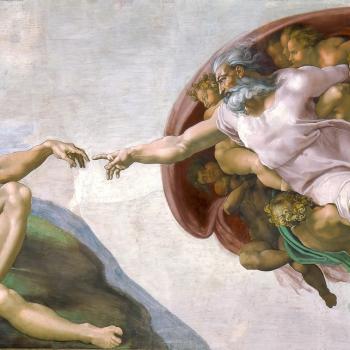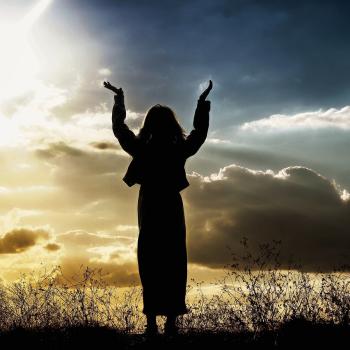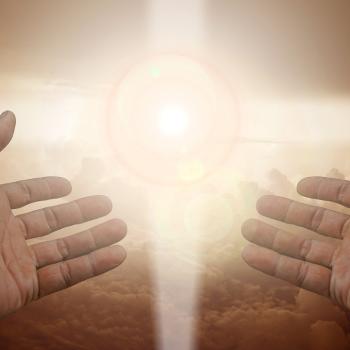 On a great canvas a master artist has painted a stunning panorama of a valley in Yosemite. To indicate the scale of this breath-taking vista, he has included the figure of a human standing beside an enormous tree. On viewing the finished work the human comments, “It is a portrait of me with some insignificant foliage as a backdrop.”
On a great canvas a master artist has painted a stunning panorama of a valley in Yosemite. To indicate the scale of this breath-taking vista, he has included the figure of a human standing beside an enormous tree. On viewing the finished work the human comments, “It is a portrait of me with some insignificant foliage as a backdrop.”
This is the hubris, the illusion, the ego-driven original sin that turns miracles into mere matter, and measures out eternity in train schedules.
And the foundation of all this misperception is the notion of “me”. There’s a reason that the first two letters of the word, “memory” spell “me”, because the essence of the sense of self is the archive that attracts all new experiences to the flypaper of past memories. It’s debilitating enough that the sense of self is built upon past memories, but we compound the illusion by selecting a non-representative sample of these and then fashioning them into a permanent self-image, often impenetrable to contradictory new experiences. “I am who I am and don’t you try to change my self-image by either pointing out a host of past memories or a slew of current experiences that would cause me to shift my self-perception”. That seems to be the defiant manifesto of most people. This should be an easily dismissed illusion but the fragile, paranoid ego is expert at creating a pastiche of real past events, distorted past events and fictitious past events.
And let me add a sidebar here to distinguish between sensations and perceptions. Sensation is to perception as a photo of a scene is to a painting of the same scene: one just gives “the facts, ma’am, just the facts” while the other gives an interpretation of the facts. In other words, perception is the interpretation of sensation; hence the Buddha’s famous insight that while pain is inevitable, suffering is optional; while pain (sickness, accidents, tsunamis, earthquakes, death…) is the price of incarnation, suffering is the result of our explanations of, our interpretations of, and our stories about these painful experiences.
To this pastiche of real, colored and fictitious past events, the ego adroitly adds memories of my job, my relationships, my bodily sensations, my emotional reactions, my perceptions and the ideas I’ve unconsciously borrowed from books, media, churches, politics and school. I’m a veritable walking compendium of other people’s programming, sitting atop an ego-constructed set of rules-for-reality.
The final puzzle piece is a mental ladle that constantly stirs up these memories into awareness in order to create and maintain the muddied soup I call, “me.”
When you think about it, each memory is limited to being merely a personal perspective on a much wider experience that Life itself is having. So, each memory is but a tiny slice of a real event; which means that my identity is built entirely of faulty, partial and incomplete data. It’s as if a minor detail in a gigantic mural were to extrapolate its own view and generalize it to describe the entire mural as simply a fractal enlargement of that one tiny detail.
So, can we ever shift out of that very limited perspective? The good news is, “yes, and we do so regularly.” At night, as we dream, physical sensations (seeing, hearing, tasting, touching, smelling) are dropped and the “self” is now created from more subtle elements. The result is that we operate from a new physics in which time, causation, conservation of momentum, conservation of energy etc. are laid aside in favor of mind-created laws and experiences. Reality is then a dance between the mind and the astral body, a much subtler one than the physical spacesuit.
But we don’t even have to be asleep to experience that; daydreaming has many of the same qualities. Here, too, the physical senses are pretty much retired and, even if your eyes are open, you’re not looking outwards as much as inwards, at alluring possible vistas and beckoning scenarios. Once more, the self is much extended.
And, of course, that can activate the imagination which is the most creatively important artistic, scientific and mystical faculty we possess. Imagination is not the ability to make up stuff which is not real (I’d call that merely, ‘fantasy’) but rather the ability to volitionally shift your state of consciousness, surf different dimensions, encounter other (“alien”) entities and energies, observe and interact with them and then return, armed with these new experiences, to graft them onto your truth-tree, and thus become a less-limited cartographer of reality.
In this journey of the imagination, if we drop memory completely, the soul is free to really explore and experience. Mostly, however, we travel with some memories and, depending on the kind of new experiences we are having, these memories can trigger fear or anxiety. By dropping all memories, we’re free to delight in each experience without pre-judgment. This is what Hinduism calls, Ananda (bliss).
Then, of course, there’s deep, dreamless sleep, in which not only are your senses turned off, but so too are your emotions, your mind and your memories. There is absolutely no sense of a separate self. There is neither a ‘you’ there nor even a ‘there’ there – except if you are an enlightened master. The mystical literature says that even in deep dreamless sleep, the enlightened ones have a sense of radical union with Awareness Itself – no separate self, no contents in the mind, only pure Consciousness.
Does that remind you a little of an infant? Infants don’t yet have a sense of a separate self; the ego won’t form until about age eight months. The infant’s sensory apparatus is still fairly rudimentary; apart from the “startle response” to loud noises, it’s not yet tracking well – visually or otherwise. And, most importantly, its memory bank (for this incarnation) is pretty much showing a zero balance. Moreover, its memory bank is leaky; new experiences don’t seem to get stored very efficiently. Sensations and emotions pass through, do their shtick and depart without trace. It hasn’t yet identified even with its spacesuit and is happy to chew on a pencil, its own big toe or mother’s nipple; all are foreign objects of immense gustatory interest. If you could engage an infant in conversation about its body and ask, “Is this your house? Do you live here?” it would probably respond, “I’m not sure; I think I’m only a visitor; I found it empty, so I came in to have a look around.”
And, yet, it has flashbacks to a time before incarnation: A sudden, full-person smile says, “Heaven? Yes, I remember that!” whereas an agonized, existential wail says, “I can’t believe I enthusiastically signed up for this!” Which is not to confuse the pre-personal infant with the transpersonal or post-personal bodhisattva. Each child, for all its flashbacks, will have to encounter the long, arduous journey of incarnation; to be marinated in the crucible of life and so, learn to love no matter the circumstance. This is a task taking many, many lifetimes.
And what about the other bookend of that journey? What happens when memory fails; when the hippocampus (which records the “facts” of the past) and the amygdala (which records the emotional residue of each event) no longer function; when dementia sets in? Such people can still have new experiences, but lack the capacity to store them. Not only may they forget events, and the names of loved ones, but may even lack any personal information, including their own names. In a sense, there no longer is an “I”, but merely the innate intelligence of an organism that still “remembers” how to breathe, walk and eat.
Is that what enlightenment looks like? Is it merely a volitional, self-imposed, advanced form of dementia? There are subtle but important differences. The enlightened one will still have sensations (though the perceptions will always be loving, compassionate ones) and will experience both emotions and ideas, but will not identify with them. So, such a one will not act out in fear, anger, anxiety, greed…
Enlightenment allows the dust particles of memory to settle, so that an ego-less, soul-filled view of reality occupies the entire screen of awareness.
Pardon me while I attempt to get out of my own way!












